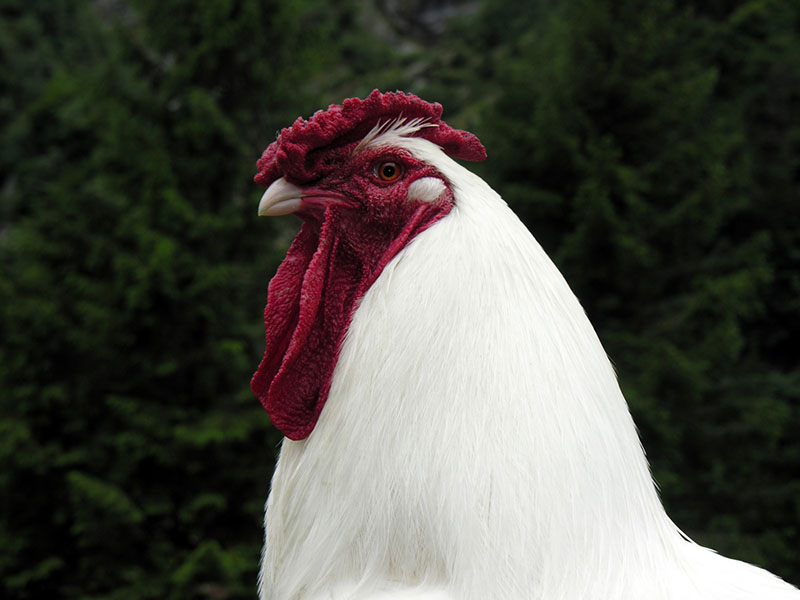Schweizerhuhn (Swiss Hen)
 According to record the Swiss Imperial Hen was bred out of white Orpington and Wyandotte hens in 1905. Albert Weiss from Amriswil was the actual founder of this breed. He was inspired by the German imperial hen breeding. In 1910 a Club was founded which worked out a standard in which the exterior, constitutional and performance features were established. Participation at fowl shows and club shows followed in the next ten years, including even a foreign exhibition in Den Haag. The many activities brought a lively growth in membership. In 1922 the name of the Swiss Hen was changed. Agricultural organizations and schools focused in the 1920s on the breeding and promotion of the Swiss Hen. They made attempts for improving fattening ability in order to develop a multi-use breed.
According to record the Swiss Imperial Hen was bred out of white Orpington and Wyandotte hens in 1905. Albert Weiss from Amriswil was the actual founder of this breed. He was inspired by the German imperial hen breeding. In 1910 a Club was founded which worked out a standard in which the exterior, constitutional and performance features were established. Participation at fowl shows and club shows followed in the next ten years, including even a foreign exhibition in Den Haag. The many activities brought a lively growth in membership. In 1922 the name of the Swiss Hen was changed. Agricultural organizations and schools focused in the 1920s on the breeding and promotion of the Swiss Hen. They made attempts for improving fattening ability in order to develop a multi-use breed.
Characteristics
Today the Swiss Hen is an elegant dual-purpose hen with pronounced performance, mid-high positioning and horizontal posture. The comb shape is a so-called rose comb. The current breeding goal for the Swiss Hen is increasing resistance and growth rate, rapid feathering and an increase in winter egg laying activity.
Standard Weights
Cock: 2.8-3.5 kg
Hen: 2.4-2.8 kg
Egg Shell Color
Cream.
Uses
The Schweizerhuhn is a dual-purpose bird for eggs and meat.
Breeding Organization
The Swiss Fowl Breeders Alliance is responsible for changes in the standards today, and it carries out evaluation of animals at its exhibitions. Since 1991 the ProSpecieRara has been assisting the Swiss Hen project with some breeding lines.
References
Endangered Domestic Animal Breeds 1995, Pro Specie Rara, Engelgasse 12a, CH-9000 St. Gallen, Switzerland, Telefon 071/222 74 20, Fax 071/223 74 01. German Translation provided by John te Velde, Associate Professor of German, Oklahoma State University
"Schweizerhuhn." Tiere - ProSpecieRara Schweiz. N.p., n.d. Web. 08 July 2015.
